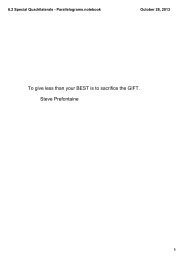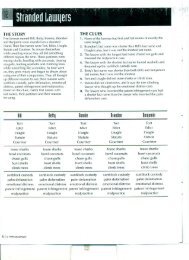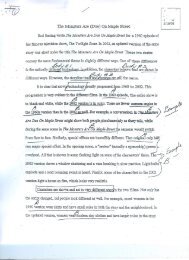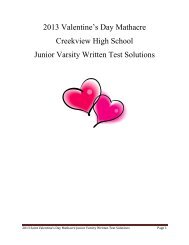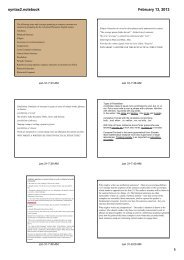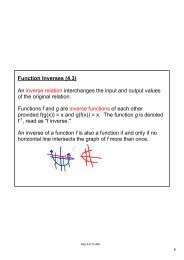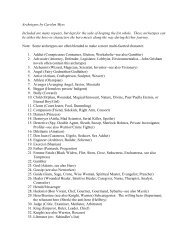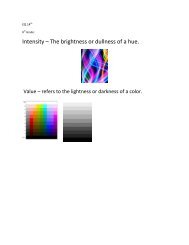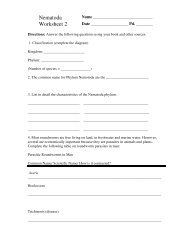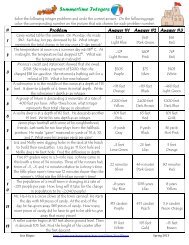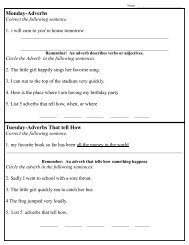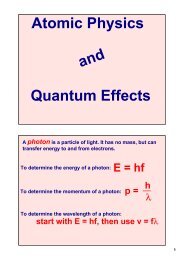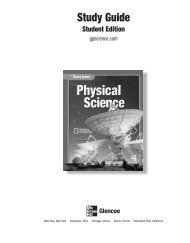Rosencrantz and Guildenstern Are Dead - Cherokee County Schools
Rosencrantz and Guildenstern Are Dead - Cherokee County Schools
Rosencrantz and Guildenstern Are Dead - Cherokee County Schools
You also want an ePaper? Increase the reach of your titles
YUMPU automatically turns print PDFs into web optimized ePapers that Google loves.
The principal manifestation of this age-old debate occurs after the Player informs <strong>Rosencrantz</strong> <strong>and</strong><br />
<strong>Guildenstern</strong> that the troupe members are not free to "decide" what they perform, for "It is written." "The bad<br />
end unhappily, the good unluckily. That is what tragedy means." Then in about one page he paraphrases what<br />
seems to be The Murder of Gonzago, the play within the play of Hamlet, which is the play within Stoppard's<br />
play. As both <strong>Rosencrantz</strong> <strong>and</strong> <strong>Guildenstern</strong> fear, however, <strong>and</strong> as we viewers realize, the Player is actually<br />
paraphrasing Shakespeare's play, from the murdering of Hamlet's father right through to the final switching of<br />
letters that culminates in the king of Engl<strong>and</strong>'s killing <strong>Rosencrantz</strong> <strong>and</strong> <strong>Guildenstern</strong>.<br />
This occasion frightens <strong>Rosencrantz</strong> <strong>and</strong> <strong>Guildenstern</strong>, combined as it is with their operating almost totally in<br />
the dark <strong>and</strong> with their play-opening experience of watching 94 consecutive coins violate the law of<br />
probability by coming up heads. But it engenders more than fear in the audience. We know, of course, that<br />
Stoppard's title marks his limitations: he cannot change the outcome that has been"written'' by Shakespeare.<br />
That much is determined.<br />
Beyond Stoppard's being confined by his predecessor, however, lie a number of similar questions about<br />
artist-creators <strong>and</strong> their creatures. How did Shakespeare alter his source? Who authored Shakespeare? In what<br />
sense is Stoppard "written"? Can we clearly separate Shakespeare's source from him as maker of Hamlet, or<br />
are artist <strong>and</strong> artifact inevitably blended <strong>and</strong> blurred, as in the case of Stoppard's choosing to have his Player<br />
create the play that turns out to be Shakespeare's Hamlet, featuring the Player <strong>and</strong> Stoppard's title-figures?<br />
Where do the mirrors <strong>and</strong> the onionskin layers of seeming begin <strong>and</strong> end? Perhaps finally (if such an adverb<br />
applies here), we in the audience want to know whether we are as doomed, as "written," as Calvin <strong>and</strong> the<br />
Player assert <strong>and</strong> as <strong>Rosencrantz</strong> <strong>and</strong> <strong>Guildenstern</strong> feel.<br />
This sense of doom descends at the end of Stoppard's play, which, as always, coincides in some sense with<br />
Shakespeare's. Just as Stoppard anticipates Shakespeare by having the Player invent Hamlet, so he alters<br />
Hamlet by having <strong>Rosencrantz</strong> <strong>and</strong> <strong>Guildenstern</strong> read Claudius's letter condemning Hamlet to death, choose<br />
not to inform Hamlet of this comm<strong>and</strong>, <strong>and</strong> then read <strong>and</strong> decline to act upon Hamlet's substituted letter<br />
ordering their own deaths. In these ways some elbow-room is given for variations or choices within fixed<br />
limits, but outcomes are nonetheless determined as "written."<br />
In view of such tight metaphysical or theological confinement, how are we to read <strong>Rosencrantz</strong> <strong>and</strong><br />
<strong>Guildenstern</strong>'s final attitude, <strong>and</strong> what is to be our own attitude? An answer may be attempted in two parts.<br />
First, ambiguity coats the term "final attitude," for, inasmuch as <strong>Rosencrantz</strong> <strong>and</strong> <strong>Guildenstern</strong> are artifacts,<br />
they do not end. They are potentially susceptible to as much literary analysis <strong>and</strong> criticism as is Hamlet.<br />
Indeed, Stoppard is having a good time with the whole critical industry, present company included. For the<br />
play suggests an additional layer of applied significance for every reader or viewer who takes in R&GAD <strong>and</strong><br />
tries to make it mean. Thus the play, like Hamlet or anything else created, will go on acquiring significance<br />
indefinitely. So much for finality, then, at least aesthetically.<br />
Second, <strong>Rosencrantz</strong> <strong>and</strong> <strong>Guildenstern</strong> <strong>and</strong> we would seem to be restricted to a certain few conclusions. We<br />
can accept the plain deterministic reading of all creation <strong>and</strong> creatures. <strong>Rosencrantz</strong> seems to take this view<br />
<strong>and</strong> to be glad to know at last where the royal ship, beyond his control, is taking him. He likes certitude <strong>and</strong> is<br />
tired. <strong>Guildenstern</strong>'s "Now you see me, now you—" [blackout] appears to comment on anyone's quick<br />
mead-hall flight between darknesses. It is hard to know whether he is suggesting a view of his own demise or<br />
is remarking on the wondrous technical expression of snuffing it.<br />
Or perhaps we can join the Player in an acceptance of whatever creative leeway is available to us, <strong>and</strong> enjoy<br />
such limited freedom within our cages. Augustine's view would be that, although we cannot work it out<br />
rationally without religious faith, the Creator's knowing our outcome <strong>and</strong> our choosing it are not<br />
contradictory. We simply cannot know the mind of God, <strong>and</strong> we err gravely if we assume that mind to<br />
Tom Stoppard's Lighted March 16



